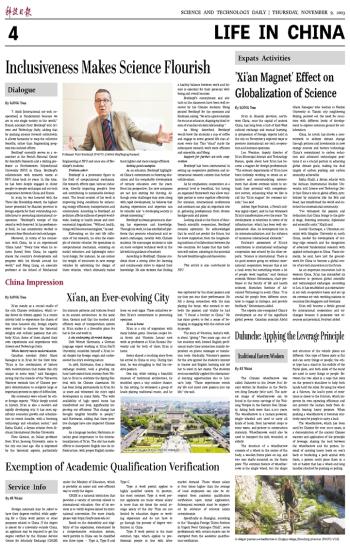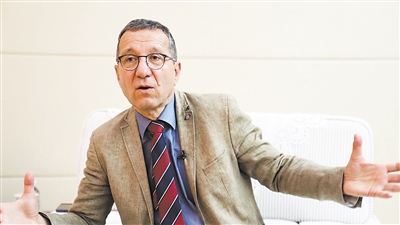
 |
| Professor Piotr Breitkopf. (PHOTO: ZHANG Wei/Beijing Review) |
"I think [international sci-tech cooperation] is fundamental because we are in one single society in the world," French scientist Piotr Breitkopf told Science and Technology Daily, adding that by pushing science forward collectively, it allows humanity to reap the collective benefits, rather than fragmenting progress into isolated efforts.
Breitkopf currently serves as a researcher at the French National Center for Scientific Research and a visiting professor at Northwestern Polytechnical University (NPU) in China. Breitkopf's collaboration with research teams at NPU dates back 20 years. In this time, he has been deeply engaged in closer people-to-people exchanges and sci-tech cooperation between China and France.
In 2023, he was honored with the Three Qin Friendship Award, the highest honor presented by Shaanxi province to foreign experts for their outstanding contributions to promoting international cooperation. "Breitkopf's receipt of this award is well-deserved. In his professional field, he has consistently worked to promote Sino-French sci-tech exchanges. Moreover, in terms of his connection with China, he is an experienced 'China hand.' Every time when he returns [home] from China, he eagerly shares the country's developments and progress with his friends around the world," said Meng Liang, an associate professor at the School of Mechanical Engineering at NPU and once one of Breitkopf's students.
Problem solver
Breitkopf is a prominent figure in the field of computational mechanics. His research efforts span various industries, directly impacting people's lives and contributing to sustainable development. The broad context of his work is improving living conditions by enhancing energy efficiency, transportation and environment. According to Breitkopf, air pollution affects millions of people worldwide, leading to health issues and environmental degradation. "Without health, things will become meaningless," he said.
Elaborating on the real-life influence of his research, he cites the example of electric vehicles. He specializes in computational mechanics, centering on model reduction and lightweight structural design. For instance, he can reduce the weight of structures in new energy vehicles by optimizing the design of these vehicles, which ultimately makes them lighter and more energy-efficient.
Setting good examples
As an educator, Breitkopf highlighted China's commitment to fostering education and the remarkable development of tertiary education over the years. From his perspective, the new campuses are not just existing but thriving. Although some challenges may arise along with rapid development, he believes that sharing experiences and expertise can be valuable and "a developing society is always interesting."
Breitkopf is always generous in sharing his experience and knowledge. Through his work, he has established platforms that promote educational and research exchanges, notably with Chinese students. He encourages students to take on more complex technical work in the lab with the guidance of teachers.
According to Breitkopf, Chinese students show a strong drive for learning and continuously strive to expand their knowledge. He also stresses that finding a healthy balance between work and leisure is essential for their personal well-being and overall success.
Breitkopf's commitment and attitude in the classroom have been well received by his Chinese students. Meng praised Breitkopf for his openness and kindness, saying, "He sets a great example for me as an educator, shaping my ideal vision of a teacher-student relationship."
As Meng described, Breitkopf would brew the students a cup of coffee and engage in some general life chat almost every day. This "ritual" made the subsequent research work more efficient and enjoyable, said Meng.
Support for further sci-tech cooperation
Breitkopf has been instrumental in setting up cooperative platforms and international research centers that further collaboration.
As he emphasizes, cooperation at a personal level is beneficial, but having an organized framework may allow multiple parties to come together effectively. For instance, international conferences and seminars can play an important role in gathering professionals from diverse backgrounds and places.
Looking ahead at the future of Sino-French scientific cooperation, Breitkopf remains optimistic. He acknowledged that he could not predict the future, but he drew inspiration from the longstanding tradition of collaboration between the two countries. He hopes that this tradition will endure, ushering in the potential for new breakthroughs and discoveries.
This article is also contributed by NPU.







